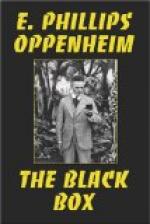“Say, it’s fine to be here!” he declared. “We have this sort of thing back home, but we are only twelve stories up and there is nothing to look at. Makes you kind of giddy here to look past the people, down at the city.”
The New Yorker glanced almost indifferently at the one sight which to a stranger is perhaps the most impressive in the new world. Twenty-five stories below, the cable cars clanging and clashing their way through the narrowed streets seemed like little fire-flies, children’s toys pulled by an invisible string of fire. Further afield, the flare of the city painted the murky sky. The line of the river scintillated with rising and falling stars. The tall buildings stabbed the blackness, fingers of fire. Here, midway to the clouds, was another world, a world of luxury, of brilliant toilettes, of light laughter, the popping of corks, the joy of living, with everywhere the vague perfume and flavour of femininity.
The young man from the country touched his cousin’s arm suddenly.
“Tell me,” he enquired, “who is the man at a table by himself? The waiters speak to him as though he were a little god. Is he a millionaire, or a judge, or what?”
The New Yorker turned his head. For the first time his own face showed some signs of interest. His voice dropped a little. He himself was impressed.
“You’re in luck, Alfred,” he declared. “That’s the most interesting man in New York—one of the most interesting in the world. That’s Sanford Quest.”
“Who’s he?”
“You haven’t heard of Sanford Quest?”
“Never in my life.”
The young man whose privilege it was to have been born and lived all his days in New York, drank half a glassful of wine and leaned back in his chair. Words, for a few moments, were an impossibility.
“Sanford Quest,” he pronounced at last, “is the greatest master in criminology the world has ever known. He is a magician, a scientist, the Pierpont Morgan of his profession.”
“Say, do you mean that he is a detective?”
The New Yorker steadied himself with an effort. Such ignorance was hard to realise—harder still to deal with.
“Yes,” he said simply, “you could call him that—just in the same way you could call Napoleon a soldier or Lincoln a statesman. He is a detective, if you like to call him that, the master detective of the world. He has a great house in one of the backwater squares of New York, for his office. He has wireless telegraphy, private chemists, a little troop of spies, private telegraph and cable, and agents in every city of the world. If he moves against any gang, they break up. No one can really understand him. Sometimes he seems to be on the side of the law, sometimes on the side of the criminal. He takes just what cases he pleases, and a million dollars wouldn’t tempt him to touch one he doesn’t care about. Watch him go out. They say that you can almost tell the lives of the people he passes, from the way they look at him. There isn’t a crook here or in the street who doesn’t know that if Sanford Quest chose, his career would be ended.”




